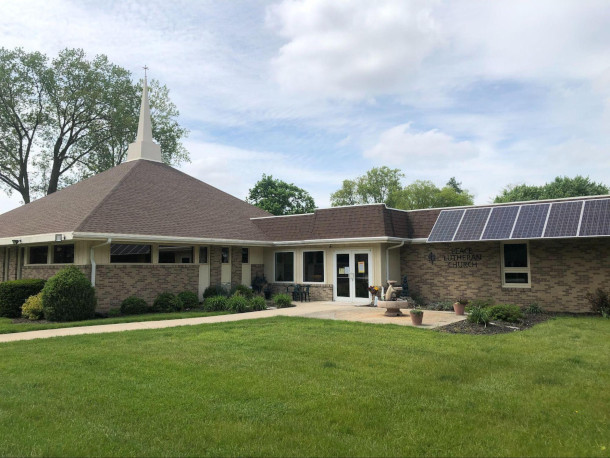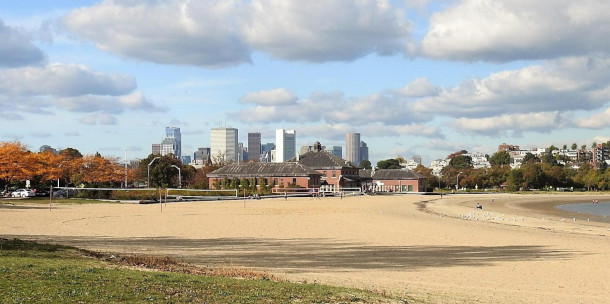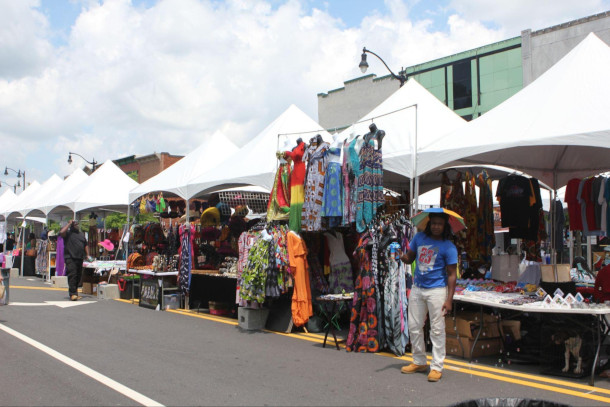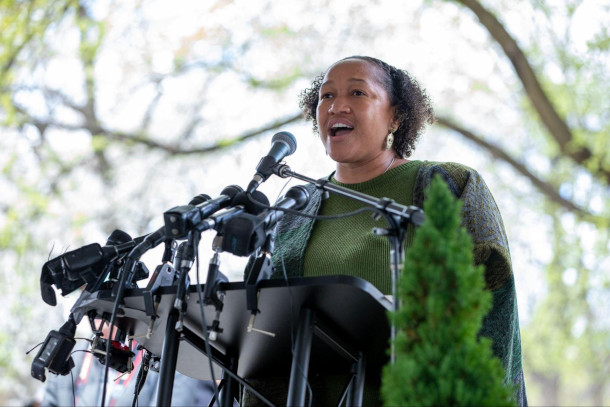Ecological Justice: "We Need Each Other"
Air Date: Week of June 20, 2025

Churches with solar panels could be resiliency hubs in times of natural disaster, suggests Rev. Mariama White-Hammond. (Photo: Mbrickn, Wikimedia Commons, CC BY 4.0)
Rev. Mariama White-Hammond and Host Steve Curwood wrap up their conversation with a discussion about how faith informed her service as former Chief of Environment, Energy and Open Spaces for the City of Boston, and how her faith continues to guide her work to bring about ecological justice.
Transcript
CURWOOD: It’s Living on Earth, I’m Steve Curwood.
Martin Luther King Jr. Day was the first federal holiday to honor an individual Black Person, and Juneteenth is the first to honor Black America as a whole, as it celebrates the end of slavery. And it is no accident that these two holidays both have spiritual roots in the Black church, where there is often plenty of music. So, let’s return to our conversation with the Reverend Mariama White-Hammond, pastor of New Roots AME church in Dorchester, Massachusetts about ecotheology and how music plays a part.
CURWOOD: Give me an example of the music you're talking about.
REV. WHITE-HAMMOND: So, one of my favorite songs is from Cross Worship, So Will I. And it talks about, for me, it's really rooted in the Christian tradition, but it talks about God being present at the beginning of time, the relationship between the challenges in our natural world and the death of Christ and the restoration of all of it. And it just, when I think of it, I remember we had a Easter Service. We did our Easter Sunrise Service, and the sun's coming up, and this song is playing, and it just, just filled me with wonder.
CURWOOD: Hey, Mariama, can you, can you sing a few words from this song for us, please?
REV. WHITE-HAMMOND: I mean, do you really want me to sing it? I mean I guess I could.
CURWOOD: Of course, yes.
REV. WHITE-HAMMOND: Okay. It says, "God of creation, there at the start, before the beginning of time. With no point of reference, you spoke to the dark and fleshed out the wonder of light. And as you speak, 100 billion galaxies are born. In the vapor of your breath, the planets form. If the stars were made to worship, so will I." And just this notion of God speaking into existence the planet and the stars, and the fact that at the end of all that God created us to be in relationship, and to see that on Easter morning as the sun was rising over Carson Beach, which is not very far from my house, it just felt overwhelming in the most beautiful way. And I think we need to do more of that. We need to help ourselves ground in where we are in the awesome miracle that is our creation and the fact that it keeps surviving in the midst of all of the damage that we're doing. So, you know, in our congregation, in July and August, we, our church is called New Roots, we do New Roots in Nature. We do church outside. We find a good place. And every once in a while, we have these, like, funny moments where I was in the middle of preaching a service, and this wind gust comes and it blew my sermon away. And I was like, it's all good. We're gonna just be fully in this moment. But we have church sometimes at a community garden where the folks over there said gave us a key, and they said, you can have church here whenever you want to.

Carson Beach in South Boston. (Photo: Hrennen, Wikimedia Commons, CC BY-SA 4.0)
This work of both sharing the teaching from our texts, but then also helping people to build real connections with the land, to be really grateful for the food we eat, and to know that it comes in this beautiful symbiotic relationship between us as human cultivators and the land as nurturers, like the fact that we work together to create the things that sustain us, the opportunity to be alongside the water, we need to not just talk about it within our congregations, but take people physically to those places, allow them to make those connections. And then, the third pillar is that we then have to say, what does it mean to be better stewards? So how do we think about the kind of work we need to do to, for instance, install solar panels. We installed solar panels on the, my parents' church, I am really excited, there's a group of AME churches organizing in Georgia to put solar panels on their, on the roof of their churches so that, one it will also reduce the bill of those churches. But those churches can also be resilience hubs in the midst of increasing natural disasters, that they would be able to produce their own energy, and so if members of the congregation experience power loss, they'd be able to go to the church as a safe haven and as a place to get information and protect themselves, and organize themselves, and then after we also embrace all of those technologies and possibilities and things that we can do to be better stewards, the final calling for us is also to be engaging around policy. How can we talk about what it means for us to be faithful, not just as communities of faith, but also as citizens. How do we hold our elected leaders accountable at every level, the municipal level and our state level and our federal level, to embracing the kinds of policies that make it easier? Because sometimes people don't install solar panels because they can't afford to, and we need to create the kinds of programs that I know folks are fighting to keep alive right now, but the kind of programs that made it easier for people to install solar on, in their houses, the kinds of programs that said those folks who have sustained a lot of damage from polluting power plants should be at the front of the line for the kinds of new energy technologies that will reduce pollution in their neighborhoods. These are the kinds of policies that allow us to live at a larger scale, those things that we try to do in our congregations and in our communities. But I think there are roles for people of faith all along, from the songs that we sing to the places that we go, to the technologies and practices that we embrace, to the policies that we promote. There at every level, we should be setting example, drawing from the teachings of our faith.

Reverend Mariama White-Hammond says Juneteenth for her is in part about joy, celebration, and community. A 2017 celebration in Marietta, Georgia is pictured above. (Photo: Communications Office, Wikimedia Commons, CC BY 2.0)
CURWOOD: Let's look at faith and policy for a moment. You're a minister, you come to work for the city of Boston as their environmental officer. I think it's the Chief of Environment, Energy and Open Space?
REV. WHITE-HAMMOND: Yeah.
CURWOOD: So how did your faith inform your work? Not the details, but how did it affect your mindset as you went into this?
REV. WHITE-HAMMOND: Yeah, so, I mean, I think a number of things. So, you know, when you work for the city, you work for the mayor, right? And that was great, and it was important, I was glad to work for both mayors that I worked under. And I also operate from the fact that I always work for someone higher than the mayor. And I think that sometimes in, in government, sometimes we can be thinking about the next election, and that could mean that we aren't actually thinking as creatively, as long term. Sometimes we're thinking we could prioritize some constituencies because of the earthly power that they have, rather than thinking about who we are called to center. So, I think, as a person of faith, I one, try to think long term, try to think about what are the impacts that this policy will have, not on the next election, but on the next generation, and how do I center that? I also said, you know, that I need to live a life of integrity, not just in the big things, but also in the small things. So sometimes, isn't it, you know, like a little example, you could write a grant in such a way that was more favorable to you, but it feels like you might be fudging the numbers a little. I can't do that. And so, I said to people, we need to have integrity. We need to be the same people that show up, no matter what it is, no matter whether it's in a grant or what we're saying to a constituency, there is a level of integrity we have to bring to how we move and how we function. And I think finally, my tradition teaches me that we center those who are most vulnerable. And so, I had to ask, can we create a policy that is not just good for the future but also repairs some of the harm that's sometimes been created and often most created in my community, and I was really thankful, for instance, to be thinking about, how do we build a tree division and plant trees in the city in a way that takes into account what neighborhoods have been overlooked in the past, what neighborhoods we know to be the hottest, what neighborhoods we know have lots of folks that do not have air conditioning? So that tree canopy that we create, the shade that it produces, could be literally lifesaving for that community. That is what my faith teaches me about how I should move, and I tried to bring that into government. So I think I didn't always talk about my faith all the time. I believe in the separation between church and state, but I, I would have moments where we would hit up against something that was like challenging, and I was like, I don't know the answer. And I would say to my, my team, okay, I'm gonna put that on my prayer list, and we'll come back to that.
Because I, you know, if you don't have the answer right away, you don't want to make a snap decision. You want to be thoughtful. And it got to the point where eventually my team would say, oh, you need to put that on your prayer list. Because sometimes there would be things like HR challenges, or we had an instance where someone was suing us, like, where I would say, gosh, we've reached a point where I'm not sure that the tools of government can totally answer this. And in a couple of instances, I did put it on my prayer list and new possibilities opened. So even though you know, none of my, you know, staff ever came to church with me or anything like that, but I do think, I hope, that I also lived as a testament to the fact that there may be, they're open to a power beyond human ingenuity, because sometimes that would have to say, okay, this is a tough one. I'm going to put it on my prayer list.
CURWOOD: So we're talking to you in the context of Juneteenth, celebrating freedom from slavery, being told to Black people in South Texas. Progress for African Americans has often been led by people of faith. The environmental justice movement, for example, begins in North Carolina with the work of Reverend Ben Chavis. He was an acolyte of Dr. Martin Luther King Jr, who obviously moved the Civil Rights Movement forward. So, you're a minister, an AME minister, African Methodist Episcopal Church minister. How do you see your role as a person of faith, moving Black America, and indeed all of America forward now to deal with the environmental and climate challenges we face?
REV. WHITE-HAMMOND: Yeah, so when I talk about my work, I frame it from the perspective of ecological justice, and I say that because eco means home, and ecology as a tradition studies, you know, study of home, but it, it really looks at the relationship between species. Many, many disciplines break things down to the cellular level, or look at individual species and only pay attention to the other, the things that's in relationship with, you know, in a cursory way. But the ecology looks at ecosystems. It looks at relationships. It says you can't understand this frog unless you understand the pond that it's in, and the pond is related to the tree, and the tree is impacted by the bird that's in there and the human that walks by, and all of these things are in relationship. And so when something goes wrong, it's actually not because any one of those pieces necessarily just went wrong. It's because the web of relationships has been disturbed, and I think the same is true in this moment. I don't actually see the environmental work as separate from the conversation I'm also part of in terms of criminal justice. I don't see it separate from the conversation around immigration and who has the right to be here. I don't see it separately from each of these things, because all of this is about how we choose to be in relationship as human beings to each other and with our non-human siblings, because we need each other. We literally need each other to survive. There's also a really good church song about that, but.
CURWOOD: There's also a really good church song about that, and what is that, Reverand White-Hammond?
REV. WHITE-HAMMOND: Yeah, so it's, "I need you. You need me. We're all a part of God's body. Stand with me. Agree with me. We're all a part of God's body. It is God's will that every need be supplied. You are important to me. I need you to survive." Now, we sing that in church to each other, but I actually believe that that is true on a planetary level, that we actually need each other to survive, and that the work we're doing right now is about climate change. I do believe that we are, we are on a deadline, but that deadline is not just about parts per million in the atmosphere. It is about recognizing that we need each other to survive, and asking about how we shift the way we are using the abundant resources that have been provided to us differently, so that not just we can survive, but that future generations can survive. And so, I as a faith leader, again, I love getting in the weeds. I can talk about solar policy and all of those things, but I think my first job is to remind us that we have a responsibility to each other and to all of the creatures with whom we're in relationship to do better, to be better. And so, I think we're in a moment where humanity is being called to be better. And we're freaking out about that, I think we are. We're having a really tough time. We are showing all of our childishness in this particular moment. And I also believe that a better world is possible, that we can be better to each other, and I think we really do want to, I think we, we're not sure we believe. We're not sure we trust each other, but I think if more of us can start demonstrating what is possible, I think others will join. Others will align. We want to be better. On our best days, we want to be better. On our best days, we know there's something better inside of us.

Reverend Mariama White-Hammond is a pastor at New Roots African Methodist Episcopal Church in Dorchester, Massachusetts, and served as Chief of Environment, Energy, and Open Space for the City of Boston from 2021 to 2024. (Photo: Joshua Qualls/Governor’s Press Office, Wikimedia Commons, public domain)
And we need to get started manifesting that right now, because we are in a deadline. The climate crisis is real and it's happening right now, but I don't believe it is too late for us to be our best selves. I have hope, even when a lot of the data does not bear out. And actually, I think that's part of what Juneteenth is about. It's about continuing to have hope, continuing to lean in, even in the face of brutality, even in the face of oppression, even when you have been done very wrong, you do not allow it to crush your spirit. And so, that is what I celebrate over Juneteenth, and that is what I hope for all of humanity. And I do believe that Black Americans can have a unique role in calling the rest of our fellow Americans and the rest of our world, because slavery could have destroyed us and it didn't. Out of it, we've created a faith tradition that is beautiful. Out of it, we've created music that is transcendent. Out of it, we have created community, and senses of family that cannot be destroyed. And I'm not pretending that we haven't struggled. We absolutely have. There are very real scars. We have been broken, but we are not destroyed. And so, too, I believe that is possible for all of humanity.
CURWOOD: The Reverend Mariama White-Hammond is the pastor of New Roots African Methodist Episcopal Church in Dorchester, Massachusetts. Reverend, thank you so much for taking the time with us today.
REV. WHITE-HAMMOND: Thank you for having me.
CURWOOD: And make it a happy Juneteenth.
REV. WHITE-HAMMOND: To you too.
[MUSIC: The Worship Initiative Accompaniment “So Will I (100 Billion x) Instrumental” 2018 The Worship Initiative]
CURWOOD: For nearly 250 years advocates for freedom believed in the possibility that slavery in America would come to an end, and Juneteenth celebrates that our nation finally made that choice. Today, those who call for the end of the enslavement of nature and ecological justice for all believe in the possibility that our better selves will stop unfair environmental practices and face the climate crisis. The question now is both if and when we get to celebrate that.
Links
The Juneteenth National Independence Day Act of 2021
The National Museum of African American History and Culture | “The Historical Legacy of Juneteenth”
Living on Earth wants to hear from you!
Living on Earth
62 Calef Highway, Suite 212
Lee, NH 03861
Telephone: 617-287-4121
E-mail: comments@loe.org
Newsletter [Click here]
Donate to Living on Earth!
Living on Earth is an independent media program and relies entirely on contributions from listeners and institutions supporting public service. Please donate now to preserve an independent environmental voice.
NewsletterLiving on Earth offers a weekly delivery of the show's rundown to your mailbox. Sign up for our newsletter today!
 Sailors For The Sea: Be the change you want to sea.
Sailors For The Sea: Be the change you want to sea.
 The Grantham Foundation for the Protection of the Environment: Committed to protecting and improving the health of the global environment.
The Grantham Foundation for the Protection of the Environment: Committed to protecting and improving the health of the global environment.
 Contribute to Living on Earth and receive, as our gift to you, an archival print of one of Mark Seth Lender's extraordinary wildlife photographs. Follow the link to see Mark's current collection of photographs.
Contribute to Living on Earth and receive, as our gift to you, an archival print of one of Mark Seth Lender's extraordinary wildlife photographs. Follow the link to see Mark's current collection of photographs.
 Buy a signed copy of Mark Seth Lender's book Smeagull the Seagull & support Living on Earth
Buy a signed copy of Mark Seth Lender's book Smeagull the Seagull & support Living on Earth

